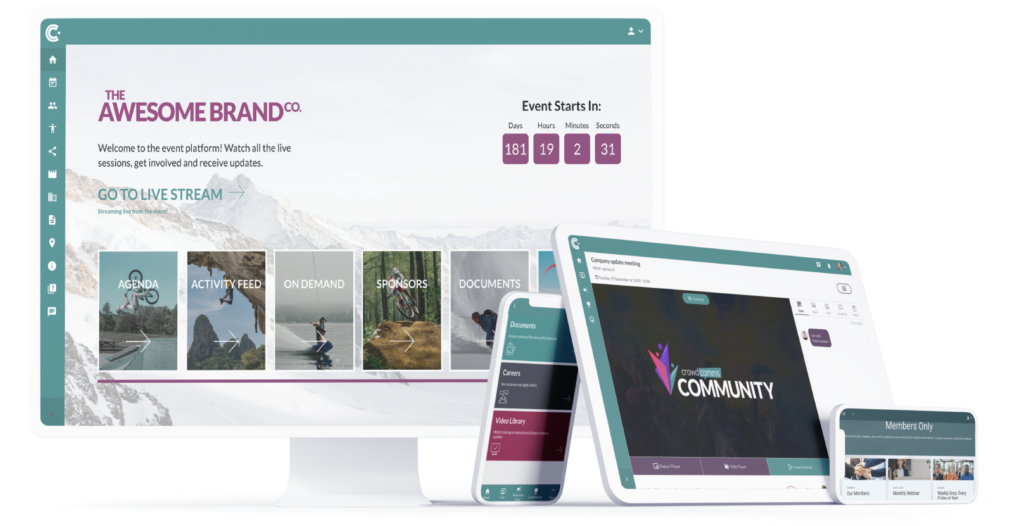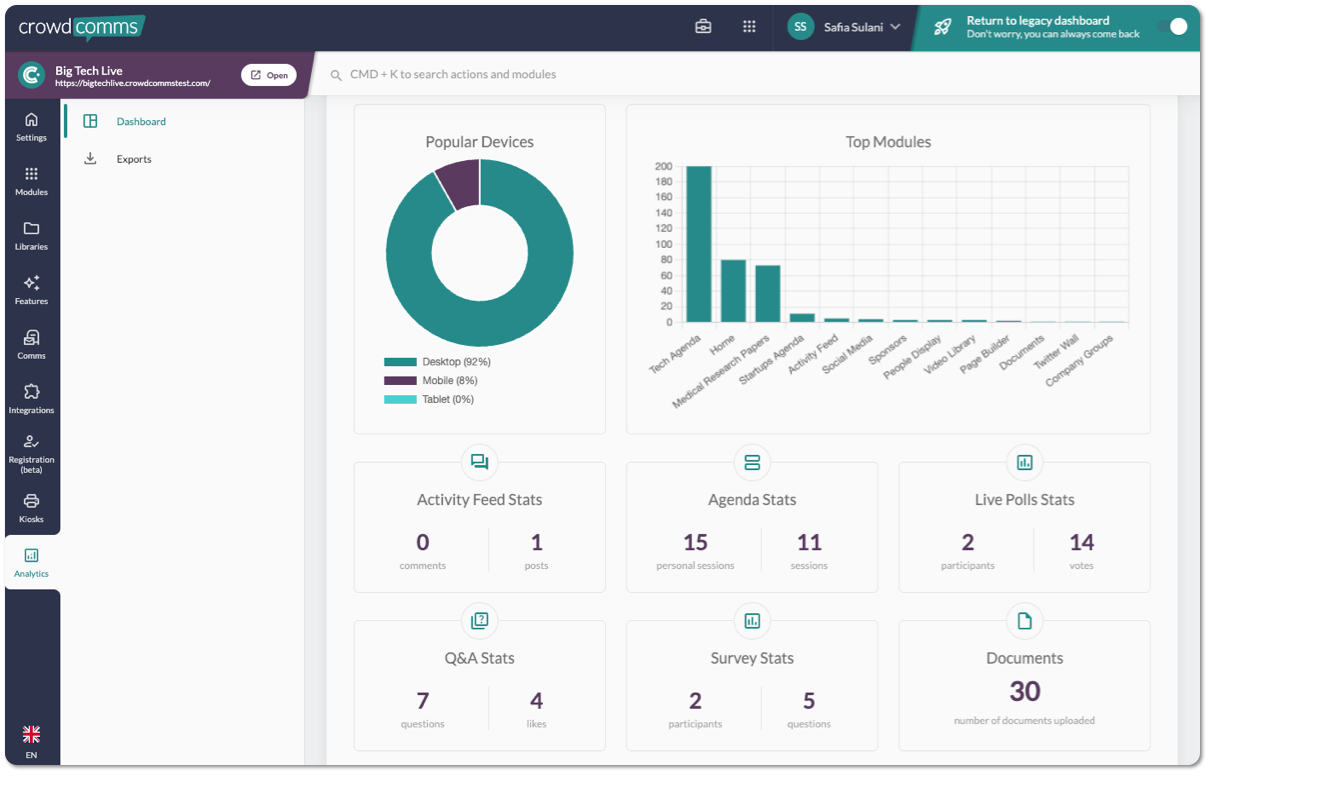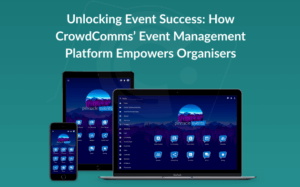
Honest Event Advice with Matt Allen, CEO of CrowdComms
Join Event Advice as CEO Matt Allen shares candid insights on events, tech, and the fun side of the events industry.

An event management platform helps you plan and execute events efficiently. From registration to analytics, these platforms streamline every aspect of event planning. This article will explain what these platforms do and highlight the top solutions to enhance your event planning.
Key Takeaways
An event management platform is a comprehensive system designed to assist event managers and event organizers in planning, coordinating, and executing events efficiently. These platforms can cover multiple aspects of event management, from handling registrations and payments to marketing and communication with attendees. Think of them as your one-stop-shop for all things event planning.
These platforms support the entire event lifecycle, from initial project management and marketing to guest management and post-event reporting. Whether you’re manage an in-person, hybrid, or virtual event, selecting the right event management software is crucial to meet your specific needs and ensure a successful outcome.
Understanding Event Management Platforms
An event management system integrates various aspects of events management into one cohesive platform for an events management business. The primary purpose of these platforms is to coordinate different aspects of event planning efficiently, centralizing tasks to streamline the process for an event manager. This centralization is particularly beneficial for large events where managing numerous tasks can become overwhelming.
These platforms are versatile, supporting both in-person and virtual events, and allowing comprehensive management from a single interface. By enhancing collaboration among team members and providing tools for budgeting and expense tracking, event management software and a project management tool can significantly improve the planning process and maximize ROI.
When evaluating event management software, it’s important to look for key features that will enhance your event planning process:
Real-time analytics are another essential feature, providing valuable insights into event success and attendee behavior.
For instance, platforms that offer advanced online event management tools and real-time analytics to help organizers make smarter decisions. Additionally, scalability is important, ensuring the platform can adapt to events of varying sizes and complexities.
Integrated marketing tools can significantly boost event success by facilitating audience targeting and promotion. Examples include:

Whether you’re planning an in-person, virtual, or hybrid event, these platforms provide the functionalities needed to ensure a successful outcome. Let’s dive into the specifics of each platform and see how they can transform your event planning experience.
Choosing the right event management platform involves several considerations. First, assess your specific needs and ensure the platform offers features that align with your event objectives.
Customizable online registration and ticketing features can enhance the user experience by providing diverse options for forms and payment methods.
Budget considerations are also crucial, especially for smaller companies. Some event management tools are free, while others offer more robust features at a cost. Lastly, seamless integration with third-party applications can streamline the event planning process and enhance data management.
When choosing event management software, it’s important to evaluate the specific needs of your event. Large events, for example, benefit from specifically designed management solutions that address their scale effectively. MICE (Meetings, Incentives, Conferences, and Exhibitions) events or niche events require specific tools to meet unique demands.
Customization of event management software can enhance workflows, enabling planners to adapt event software tools to their specific processes. By aligning the platform’s features with your event objectives, you can ensure a more efficient and successful event planning process.
Budget considerations play a significant role in choosing the right event management platform. While some tools are free, offering basic functionalities, others provide more advanced features at a cost. For smaller companies, balancing cost with the feature set is crucial to optimize the event planning process.
Paid event management tools often include robust features that can save time and enhance the overall planning process, although some aspects can be time consuming. It’s essential to weigh the key benefits against the costs to determine the best solution for your needs.
Integration capabilities are vital when selecting an event management platform. Choosing software that integrates seamlessly with your existing tools can streamline operations and enhance productivity. This reduces the need for additional training and adjustments, improving overall workflow efficiency.
Platforms that offer all in one solution, focusing on customer engagement and key benefits, can significantly enhance the event planning process and streamline processes. By ensuring compatibility with existing systems, you can create the best solutions for a more cohesive and efficient event management experience.
The benefits of using an event management platform are numerous:
Comprehensive reporting and analytics tools allow planners to gain insights into attendance tracking and engagement metrics at various venues, which are crucial for informed decision-making. A great tool is mobile apps integration, which further enhances the attendee experience by providing features like interactive maps and real-time updates.
Overall, using an event management platform fosters collaboration, enhances the attendee experience, and provides vital data insights to improve future events.
Enhancing attendee engagement is critical for the success of any event. Effective communication tools within event management software, such as automated reminders and social media integration, play a significant role in this. Gamification strategies, like scavenger hunts and quizzes, can elevate attendee excitement and engagement during events.
Interactive sessions that invite attendee participation, such as live polls, panel discussions, or Q&As, significantly boost engagement. Additionally, facilitated networking opportunities, like virtual breakout rooms, allow virtual attendees to connect and engage meaningfully.
Hybrid events, combining in-person and virtual experiences, are becoming increasingly common due to their flexibility and ability to reach global audiences.
The Royal College of Emergency Medicine (RCEM) partnered with CrowdComms to reimagine its Annual Scientific Conference as a sustainable, year-round virtual-first experience. The goal was to expand access for clinicians unable to travel, deliver immersive learning, automate CPD accreditation, and build an engaged professional community.
CrowdComms’ Virtual Platform integrated registration, content delivery, real-time interaction, and learning tools into one seamless solution. Attendees accessed live-streamed sessions with 12-month on-demand replay, interactive Q&A, polling, resource-rich materials, and automated CPD tracking. The platform also extended engagement post-event through discussion and networking features.
Results were significant: a 30% increase in digital attendance, 70%+ audience participation, 100% CPD compliance, and a 4.8/5 satisfaction score. Most sessions were rewatched twice or more, maximising educational value.
By combining robust technology with full technical production and support, CrowdComms helped RCEM deliver an inclusive, secure, and sustainable learning experience that continues to deliver value long after the event.
You can read the full case study here.
The future of event management is being shaped by emerging event tech and event technology. Artificial intelligence is transforming event planning by automating repetitive tasks, allowing planners to focus on more strategic and creative aspects
Sustainability is becoming a priority, with a trend towards virtual platforms and paperless systems to minimize environmental impact. These advancements are not just trends but pivotal shifts that will define the future of event management, offering new ways to engage attendees and create impactful events.
In summary, event management platforms are indispensable tools that streamline the event planning process, enhance attendee engagement, and provide valuable insights through advanced analytics. By choosing the right platform tailored to your specific needs, you can ensure a successful and memorable event.
The future of event management looks promising with the integration of AI, and sustainable practices. Embracing these trends will not only improve the efficiency of your events but also create more engaging and environmentally friendly experiences.
Choose wisely, and transform your event planning process today. Call CrowdComms to book your demo today.
An event management platform is a comprehensive tool that helps organizers plan, coordinate, and execute events efficiently, covering key areas like registration, payments, marketing, and attendee communication. This system streamlines the entire event process for a smoother experience.
Event management platforms enhance attendee engagement by providing tools such as live polling, gamification, and personalized communication, which foster interaction and participation. This creates a more dynamic and interactive experience for attendees.
When choosing an event management platform, it’s crucial to assess your specific needs, budget, and integration capabilities with existing tools to facilitate a smooth planning process. Prioritizing these factors will help you select the most suitable platform for your events.
Yes, there are free event management tools available, such as Trello, though they may come with limited features compared to paid versions.
The future trends in event management platforms emphasize the integration of artificial intelligence and immersive technologies like augmented and virtual reality, alongside a commitment to sustainability through virtual solutions and paperless systems.

Join Event Advice as CEO Matt Allen shares candid insights on events, tech, and the fun side of the events industry.

Discover how CrowdComms’ event management platform helps organisers enhance attendee engagement and streamline onsite check-in.

Join CrowdComms CEO Matt Allen and SVP Americas Brad Langley as they explore US vs UK event tech, why service matters, and how flexible event solutions are changing the game for planners.
Whatever your vision for your next virtual, hybrid or in-person event, we can help.
Whatever your vision for your next virtual, hybrid or in-person event, we can help.
Whatever your vision for your next virtual, hybrid or in-person event, we can help.
Whatever your vision for your next virtual, hybrid or in-person event, we can help.